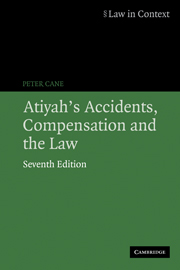Book contents
- Frontmatter
- Contents
- Preface
- List of abbreviations
- List of tables
- Table of legislation
- Table of cases
- Part One The Issues in Perspective
- Part Two The Tort System in Theory
- 2 Fault as a basis of liability
- 3 The scope of the tort of negligence
- 4 Departures from the fault principle
- 5 Causation and remoteness of damage
- 6 Damages for personal injury and death
- 7 An appraisal of the fault principle
- Part Three The Tort System in Operation
- Part Four Other Compensation Systems
- Part Five The Overall Picture
- Part Six The Future
- Index
4 - Departures from the fault principle
Published online by Cambridge University Press: 05 June 2012
- Frontmatter
- Contents
- Preface
- List of abbreviations
- List of tables
- Table of legislation
- Table of cases
- Part One The Issues in Perspective
- Part Two The Tort System in Theory
- 2 Fault as a basis of liability
- 3 The scope of the tort of negligence
- 4 Departures from the fault principle
- 5 Causation and remoteness of damage
- 6 Damages for personal injury and death
- 7 An appraisal of the fault principle
- Part Three The Tort System in Operation
- Part Four Other Compensation Systems
- Part Five The Overall Picture
- Part Six The Future
- Index
Summary
Fault liability and strict liability
The fault principle, as embodied in the concept of negligence, is not the only basis of legal liability for personal injuries and death, although it is, in practice at least, by far the most important. In this chapter we will consider modifications to and departures from the fault principle. Such modifications and departures are often said to impose ‘strict liability’ as opposed to fault liability. Whereas fault liability is based on a judgment that a person should have behaved differently (for instance, by taking certain precautions), strict liability does not involve any judgment that the person should have behaved differently. Putting the same point another way, fault liability is liability for the way a person behaved whereas strict liability is liability for consequences of a person's conduct. Strict liability has often been thought to be morally unjustifiable, even if it has its uses as a legal device – how can it be fair to hold someone liable for the consequences of behaving in a perfectly acceptable way? How can we justify responsibility in the absence of culpability? The best answer to this question appears to be that even in morality (as opposed to law) we sometimes accept responsibility and hold others responsible for things that were not our, or their, fault. For example, if a young child accidentally breaks a neighbour's window while playing ball, its parents might well feel that they ought (morally) to accept responsibility for the broken window and pay to have it replaced, even if they took all reasonable care in supervising their child.
- Type
- Chapter
- Information
- Atiyah's Accidents, Compensation and the Law , pp. 92 - 109Publisher: Cambridge University PressPrint publication year: 2006

